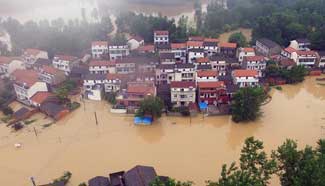BEIJING, July 2 (Xinhua) -- China's top legislature on Saturday adopted a revised law on wild animal protection, which outlaws production and purchase of food made from state-protected wild animals.
The law was adopted after a third reading at a bi-monthly session of the National People's Congress (NPC) Standing Committee. It will take effect on Jan. 1, 2017.
The amended law bans the production and sale of food made from state-protected wild animals and products derived from them, as well as food made from those not under special state protection but lacking proof of legitimate sourcing.
It also bans illegal purchase of state-protected wild animals and derived products for food. Offenders could face criminal penalties.
Meanwhile, the law strengthens regulation of the use of wild animals and products derived from them.
It bans hunting, sale, purchase, and use of state-protected wild animals or derived products, unless for scientific research, captive breeding, population regulation, monitoring of disease, or other purposes.
It mandates that permits should be obtained for the hunting, captive breeding, sale, purchase, and use of state-protected wild animals or derived products.
The use of wild animals and derived products should rely mainly on captive-bred animals, and it must not hurt wild populations and habitats, Yue Zhongming, vice head of an office for economic law under the NPC Standing Committee's Legislative Affairs Commission, told a subsequent press conference.
The revised law establishes the principle of prioritizing protection of wild animals, regulating the use of them and strict supervision.
This is in line with China's actual conditions and internationally accepted practices, Yue said.
The amended law provides that the central government adjusts the special state protection list every five years based on evaluation results.
Animals bred under controlled conditions through mature methods may be removed from the special state protection list, it says, adding those removed from the list are regulated differently from wild ones.
Captive-bred sika deer, for instance, could be removed from the list, as millions have been bred under controlled conditions nationwide, Yan Xun with the State Forestry Administration told the press conference.
Critically endangered species, such as finless porpoise, could be shifted from the second-class state protection list to the first-class list, Yan said.
Meanwhile, the amended law regulates the release of captive animals to the wild.
Authorities at provincial level and above can organize activities involving the release of state protected animals to the wild, according to the law.
Any organization or individual releasing captive animals should choose indigenous species that are fit to survive in the wild, and the release should have no impact upon local people or harm the ecosystem, it says.
Anyone who frees captive animals in a reckless manner, thus causing property damage or physical injury to others, or jeopardizing the ecosystem, will be held accountable, it says.











